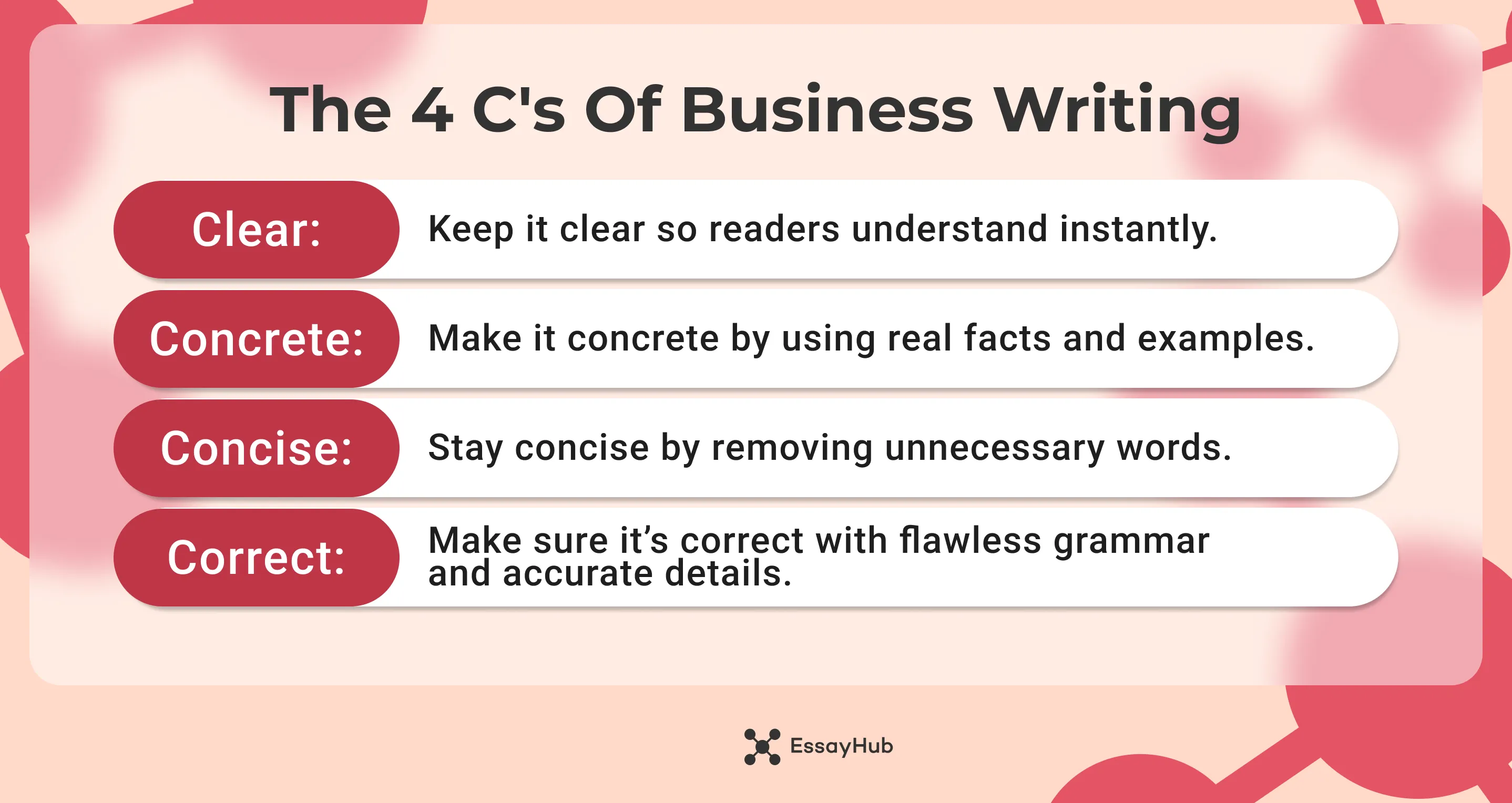Business writing decides how people respond to you. A messy email or vague report wastes time and trust. According to the National Association of Colleges and Employers (NACE), 73.4% of employers look for strong written communication skills in job candidates.
This guide shows what makes business writing easy to follow. You’ll see how to use the 4 C’s, write better emails, and fix weak spots fast.
As a student trying to figure out how writing business English works, you can turn to EssayHub for direct help with our business essay writing service. Strong writing opens doors, and this article shows how to get there.
What Are the 4 C's of Business Writing?
The disappointment that follows business emails is immense. You think you’ve written a solid piece, but the response you receive is silence or even worse, confusion. Four rules separate emails that get answers from those that don’t:
- Clear
- Concrete
- Concise
- Correct

Clear
People read with one question in mind: What do I need to do with this?
On the other hand, you must start writing by asking yourself: What’s the single thing I want the reader to know, decide, or do?
Readers often get confused by the small assumptions that you leave behind. For example, you might write something like ‘the project will move to Phase 2 once the client signs off.’ On the surface, it looks all right. But does the client know they have to sign? If not, who tells them? And when is the deadline, anyway? All those questions will be answered with a clearer version: ‘The client must sign the approval form by Monday, or Phase 2 will be delayed.’
Concrete
You have to remove every chance for the reader to misinterpret, and vague language won’t help you do that. It leaves room for multiple conclusions that lead to delays and mistakes.
Plus, people don’t act on blurry promises; they act on specifics. The ‘I’ll send the file soon’ leaves them guessing. You’ll ‘have it by Friday at 3 PM’ leaves them sure. Details, such as dates, numbers, and names, show you’re paying attention, and they make others more willing to trust what you say.
Concise
Concise writing cuts the dead weight. It doesn’t ramble or circle back or try to fill space. Every word has a reason to be there. The truth is, no one is sitting at their desk hoping for a longer email. Readers want the point, fast. So trim the extra and drop the fillers. Write it as if the reader has only a minute, because they probably do. Short and sharp is what works.
Correct
Correct writing shows respect. Typos and grammar errors tell the reader you didn’t care enough to check. They might forgive it once, but they’ll notice. Read it over and fix what’s off. Use tools if you want, but don’t rely on them to catch everything. This part proves that you took time to get it right.
Formatting Guidelines
Formatting is what decides if your writing gets read or skipped. That’s it. You can have the smartest ideas in the world, but if they’re buried in long blocks of text or weird layouts, no one’s sticking around.
Here’s what actually helps:
- Use Arial or Times New Roman
- Font size 11 or 12 only
- Keep 1-inch margins all around
- Break content with clear headings
- Use bullets or numbered lists
- Limit paragraphs to 3–5 sentences
- Proofread for errors and consistency
How Business Writing Differs from Creative Writing
Here’s a crisp comparison that highlights how these two styles diverge with practical examples:
Business Writing Example:
‘The budget draft needs your review by Thursday at noon. Approval by then ensures it reaches finance ahead of the Friday deadline.’
Everything is explicit: who, what, when, and why.
Creative Writing Example:
'The parade of numbers marched across the spreadsheet, a symphony of hopes and risks, a silent promise of growth waiting in the wings.'
Emotive, descriptive, atmospheric, no action steps.
How to Improve Business Writing Skills in English
Business writing is where every word either earns attention or wastes it. When the message is clear, people answer faster, decisions happen sooner, and projects stop stalling. Here’s what you can do to improve your business English writing skills:
- Embrace the active voice and action words
- Prioritize clarity and brevity
- Foster authenticity and transparency
- Perfect your grammar and punctuation
Each of these shifts how your writing lands. They’re small moves that create a huge difference in how readers react.
And if you’re balancing assignments while trying to sharpen those skills, using EssayHub’s economics essay writing service can make the learning curve easier for you.
1. Embrace Active Voice and Action Words
Passive sentences hide the person doing the work. The active voice drags them out into the light, and suddenly, the sentence punches back.
Example:
Passive: 'The report was reviewed by the manager.'
Active: 'The manager reviewed the report.'
Quick tip: Every time you write, ask: Who is doing this? Start there and say it straight.
Active voice + action verbs = sentences that feel alive. ‘He solved the issue’ beats ‘The issue was solved.’
2. Prioritize Clarity and Brevity
Clarity and brevity double it down, because they’re strong and fast. The reader shouldn’t work to ‘get it.’ They should see the point before they blink.
What to do:
- Cut dead words (just, very, in order to).
- Put the point in the first line.
- Break long sentences into two or three clean hits.
‘The meeting is tomorrow’ wins over ‘At this point in time, it is important to consider…’
Remember, short doesn’t mean less: it means clear. Clear writing respects time, and respect always wins.
3. Foster Authenticity and Transparency
Now, let’s talk about tone. Authentic writing has nothing to do with posture and trying to sound smart. It feels like a person talking to another person with honesty.
What to do: Be honest, say the real thing, and don’t try to sell the half-truth, however polished it might sound. If you need help, admit it. This will win you respect.
It can be tempting to use clichés and corporate slang, but always keep the tone natural. Saying ‘think outside the box’ or ‘hit the ground running’ won’t get you anywhere.
4. Check Your Grammar and Punctuation
Every mark signals how carefully you wrote it. A misplaced comma changes meaning. A weak sentence structure slows readers down and drains impact.
Imagine reading a smooth road versus hitting potholes every five seconds. That’s what good grammar feels like, an unbroken flow. Bad grammar jerks the reader out of the message. In effective English business writing, precision in these details matters more than you probably think.
How to do it:
- Read your text out loud. If you trip halfway through, fix it.
- Look for verb mismatches, missing articles, absent commas, etc.
- Use grammar tools: Grammarly for small issues, ProWritingAid for deeper ones, and Hemingway Editor for simple writing.
Common Types of Business Documents
Every piece of writing in business carries a job to do. Some messages push projects forward, others convince decision-makers, and a few shape how customers see the brand. Understanding the role behind each document changes how you approach it:
- Emails: Quick, targeted messages used for updates, requests, and day-to-day communication. Start with a friendly but professional greeting, use a concise subject line, and keep the body between 50-125 words.
- Reports: Structured documents that analyze data, present findings, and recommend actions. Use headings and subheadings, use bulleted lists, charts, or tables. Keep the tone formal but clear.
- Business Letters: Formal communications sent to clients, partners, or organizations, often carrying weight in negotiations or official matters. Start with a formal salutation and make sure each paragraph focuses on the single idea. End with a closing line similar to the salutation.
- Instant messaging services (Slack, Teams, etc.): They cut through email clutter and get answers in seconds. Skip greetings if the thread is active. Keep messages tight: one update, one question, or one action at a time. Use bullet points if you’re dropping multiple links.
- Memos (formal notes sent to employees): They announce shifts that affect how people work, from policy updates to leadership changes. Start with a strong heading that names the topic and date. The first paragraph should tell staff what’s changing and why. Use short and punchy paragraphs.
- Proposals (formal offers to do project work): Proposals are persuasion on paper. They tell a story where the client or manager becomes the hero who wins by choosing your solution. Begin your proposal with a problem, then introduce your solution that will be backed up with evidence and claim.
- Promotional materials: This writing speaks to the outside world. Brochures, ads, landing pages, all of them need to grab attention fast and hold it long enough to spark action. Keep it scannable with a catchy headline, emotional copy, bold fonts and tight sections.
How to Write Better Business Emails?
Better emails get read, answered, and acted on. Here’s what you need to do:
- Clear and Concise Subject Line: When the recipient opens your email, they shouldn’t have to search for the point of your email. Get into the report quickly. Eliminate the backstory unless necessary to prove or illustrate your point.
Bad: Quick question!!!
Better: Request for Q3 budget approval by Thursday
- Focused and Direct Content: If your important details are buried in the second paragraph, it can probably go away. Use short and concise sentences that are written in a way that you would say them in a meeting.
- Professional Tone and Language: A mathematical formula for writing professional an emails is: formal tone + clean language. Keep politeness in your language, but not casual. Don’t use emojis, unnecessary fillers like 'just checking in' or 'used to be plus' and no slang.
- Address the Receiver Directly: How you start the email sets the tone. Think about the level of formality based on who you're writing to.
Formal: Dear Ms. Rivera,
Neutral: Hello James,
Familiar: Hi Sam,
- Bullet Points or Lists: Use bullet points or numbered lists to separate several points or a series of action items. This style makes your writing stand out and it becomes easier to scan and map, and quicker for the reader to digest.
- Proofread and Edit: Read the email for any spelling errors, unclear voice and misuse of words. Double check on names, dates, and other details. It helps to read an email aloud or ask a colleague for feedback.
- Use Dates and Numbers: To prevent guesswork, use specific dates, times, and numbers.
Spell out numbers below 10 and use numerals for 10 and above: Three new hires start next week.
Include exact dates: Let’s meet on Monday, August 11 at 10:00 a.m.
- Be Concise: Emails should be short, ideally 50-125 words. Emailing briefly shows respect and guarantees that the reader will actually read the message.
Feel free to use our essay service for more writing guidance.
How to Level Up Your Business Reports and Proposals?
Here are 7 meaningful tips to improve your business writing of reports and proposals. For a full guide, see our article on how to write business reports:
- Simplify complex concepts
- Focus on actionable recommendations
- Structure your document effectively
- Use visual aids wisely
- Provide evidence and supportive data
- Focus on clarity and readability
- Customize for different stakeholders
1. Simplify Complex Concepts
Big ideas fall flat when they hide behind buzzwords. Readers, especially the busy ones with a lot going on, don’t need fancy; they need to be clear. The faster they get it, the faster they act. Break technical talk into words they’d use in a conversation. If a term is necessary, explain it in plain language. Better yet, give them a real example they can see in their head. That’s when the lightbulb goes on.
- Bad: The Q3 strategic initiative involves leveraging cross-functional synergies to optimize workflow efficiency across departments.
- Good: In Q3, marketing and design teams will work together to shorten project timelines by two weeks.
The second version works because anyone reading it knows exactly who is doing what, and by when.
2. Focus on Actionable Recommendations
Don’t leave your reader wondering, ‘So… what now?' Make sure every section of your writing predicts a clear next step. Use strong verbs like 'revise,' 'launch,' or 'adopt' that convey what the reader must DO.
3. Structure Your Document Effectively
Start strong. Lead with an executive summary that highlights key insights right away. Next, divide your content into distinct sections, and add meaningful headings, so the reader can jump to whatever's most important to them.
4. Use Visual Aids Wisely
Charts, graphs, and tables aren't fillers. With them, the reader can better visualize your points. Use graphics when there isn't enough space to communicate your information with words, but keep them uncluttered, readable, and relevant. A messy chart could be worse than no chart.
5. Provide Evidence and Supportive Data
Back up your claims and recommendations with relevant evidence and data. Use credible sources, research findings, case studies, or real-world examples to support your arguments and lend credibility to your writing. Be transparent about your information sources and provide citations or references where necessary so readers can verify the information independently.
6. Focus on Clarity and Readability
Strive for clarity and readability in your writing. Use plain language and avoid unnecessary jargon or technical terms that may confuse or alienate your audience. Break up long paragraphs into shorter, more manageable chunks, and use bullet points or numbered lists to highlight key points or action items. Proofread your document carefully for grammar, spelling, and formatting errors to ensure it is polished and professional.
7. Customize for Different Stakeholders
Tailor your reports and proposals to the needs and preferences of different stakeholders. Consider what information is most relevant and valuable to each audience group and customize your writing accordingly. For example, executives may be interested in high-level summaries and strategic implications, while technical teams may require more detailed analysis and data.
Business English Writing Examples
The best way to learn business writing is by spotting the difference between what drags and what gets results. These business English writing examples show exactly that.
Bad: We are reaching out to touch base and follow up regarding the ongoing project that is in the process of being finalized sometime soon. Please respond at your earliest convenience to move forward with the next steps.
Improved: We’re checking in on the project nearing completion. Please confirm by Friday so we can move to the next phase.
Why does this work?:
- The original version uses vague, filler phrases that add no real value.
- The revised version gets straight to the point with a clear purpose.
- A specific deadline (by Friday) tells the reader exactly when to respond.
- The tone is professional yet simple, making the message easy to act on.
- Clear writing drives clear action.
Closing Remarks
Here’s a quick wrap-up of the key formatting guidelines for Business English writing:
- Keep it clear and concise
- Maintain professionalism
- Stick to a clear format
- Organize well
- Check your grammar and spelling
- Be polite, always
If writing feels like a mountain to climb, EssayHub has got your back. From any business essay to research papers, we’ll help you breeze through the tough stuff, so you can focus on what really matters!
FAQs
What are the Five Basics of Business English?
To do well in the business world, you need a few core skills in business English:
- Using the right professional vocabulary
- Keeping your writing clear
- Speaking confidently in meetings
- Giving engaging presentations
- Knowing the dos and don’ts of business etiquette.
These skills work together like building blocks for professional success.
How to Improve Business English Writing Skills?
Use four C’s: be clear, concrete, concise, and correct. Read your message carefully and out loud to spot errors, then use grammar tools to fix those errors.
What is Business English Writing?
Business writing is a professional form of communication, such as emails, reports, proposals, and other business documents. It focuses on clarity and purpose and helps the reader understand and act quickly.
- Corporate Finance Institute. (n.d.). Business writing: Definition, types, and examples. Retrieved from https://corporatefinanceinstitute.com/resources/career/business-writing/
- University of Roehampton. (n.d.). Future-proof your career: Top 5 skills employers want now. Retrieved from https://www.onlinestudy.roehampton.ac.uk/blog/future-proof-your-career-top-5-skills-employers-want-now
- Oxford Royale Academy. (n.d.). 8 tips for writing in business English. Retrieved from https://www.oxford-royale.com/articles/8-tips-writing-business-english






